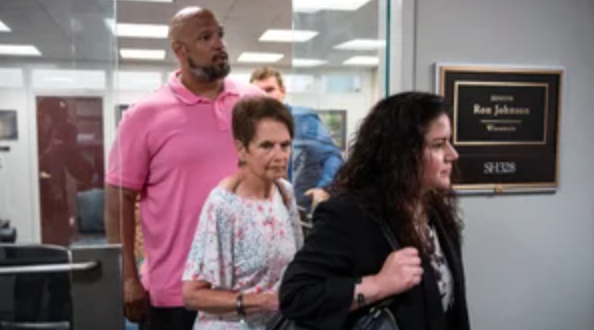
The mother of a Capitol Police officer who died after engaging with the mob during the Jan. 6 insurrection pleaded with Republican senators on Thursday to vote for legislation that would establish a bipartisan commission to investigate the attack on the Capitol.
Brian Sicknick‘s mother, Gladys Sicknick, was joined on Capitol Hill ahead of a possible Senate vote later Thursday on the legislation with her son’s partner, Sandra Garza, as well as Metropolitan Police Officer Michael Fanone and Capitol Police Officer Harry Dunn.
The Senate is expected to hold a procedural vote as soon as Thursday on advancing legislation passed by the House last week to establish a commission to investigate the events of Jan. 6. But it currently appears to lack the support of the at least 10 Republican senators needed to overcome a filibuster.
So far, only a few Republicans — Sens. Mitt Romney (Utah), Susan Collins (Maine) and Lisa Murkowski (Alaska) — have signaled support for advancing the legislation.
Sicknick and Garza — as well as Fanone and Dunn, who both helped defend the Capitol on Jan. 6 — are meeting with as many Republican senators as possible to lobby for creating a commission. But just 35 House Republicans voted with Democrats last week for the bill, with the top two GOP leaders in each chamber opposed.
“This is why I’m here today. Usually I stay in the background. And I just couldn’t stay quiet anymore,” Gladys Sicknick said after meeting with Romney.
An autopsy indicated that Brian Sicknick suffered two strokes and died a day after responding to the attack on the Capitol, after initial reports that he was hit in the head with a fire extinguisher. Two other police officers on duty that day, Howard Liebengood of the Capitol Police and Jeffrey Smith of the Metropolitan Police Department, died by suicide in the days that followed.
“It’s been excruciating,” Garza said of the last four months since Sicknick died. “It was also very hard to know that his last moments on Earth were, you know, dealing with what he had to deal with.”
Fanone, who was dragged down the Capitol steps and beaten by the mob of former President Trump‘s supporters on Jan. 6, has been vocal about the trauma he’s still struggling with months later.
“As someone who responded to Jan. 6, I’m here to educate senators about my experiences that day. And as an American, I’m here to advocate for the commission because I want to see Congress come together in a bipartisan fashion,” Fanone said.
“Getting to the truth and the bottom of everything shouldn’t be a problem with anybody,” Dunn said.
Despite the emotional appeals from Sicknick’s mother and partner as well as the police officers on duty on Jan. 6, Republican senators largely appeared to be unmoved from their positions.
Sen. Ron Johnson (R-Wis.) — who said last week that the riot was largely a “peaceful protest” and denied it should even be called an insurrection — said in a statement after meeting with the group Thursday that he offered “heartfelt condolences” to Sicknick and Garza, but still did not support creating the commission.
“I cannot imagine the pain of losing a child, and words cannot adequately express my sympathy for their loss. I sincerely thanked Officer Harry Dunn and Officer Michael Fanone for their service and expressed my strong support for law enforcement,” Johnson said.
“I also asked what questions regarding Jan. 6 they are seeking answers to. Although we respectfully disagreed on the added value of the proposed commission, I did commit to doing everything I could to ensure all their questions will be answered,” Johnson added.
Collins has filed an amendment that would require commission staff to be jointly hired by the top Democrat- and Republican-appointed chairs in an attempt to ease fellow Republicans’ concerns that the commission would be slanted toward Democrats.
“We owe it to the brave men and women who defended our lives that day. And in some cases did so at the cost of their lives,” Collins said Thursday after meeting with Sicknick’s family, Fanone and Dunn.
The group lobbying for the commission legislation is also expected to meet with other Republican senators on Thursday, including Senate Minority Leader Mitch McConnell (Ky.) and Sens. Bill Cassidy (La.), Mike Crapo (Idaho) and Lindsey Graham (S.C.).
“I do not believe the additional, extraneous ‘commission’ that Democratic leaders want would uncover crucial new facts or promote healing. Frankly, I do not believe it is even designed to,” McConnell said Thursday on the Senate floor. “So I’ll continue to support the real, serious work of our criminal justice system and our own Senate committees.”
Under the House-passed bill, the commission would be composed of 10 members evenly split between Democrats and Republicans with co-equal subpoena power.
Members of the commission would have to be experts in intelligence, law enforcement, counterterrorism or related fields. Their due date for issuing a final report would be the end of this year.
When asked what she wants senators to be thinking about when they cast their votes, Garza replied: “I want them to be thinking about Brian Sicknick, Officer Liebengood and Officer Jeffrey Smith. They sacrificed their lives that day.”
Via The Hill


